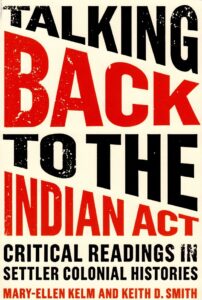Book review: Talking Back to the Indian Act: Critical Readings in Settler Colonial Histories
 Reviewed by Karl Hele
Kelm and Smith’s edited collection of documents seeks to challenge students and general readers to undertake a critical analysis of the Indian Act. The authors of Talking Back to the Indian Act: Critical Readings in Settler Colonial created the volume to help readers more fully answer the 94 Truth and Reconciliation Commission of Canada (TRC) calls to action by helping people understand Canada’s colonial history and its problematic relationship with First Nations.
Reviewed by Karl Hele
Kelm and Smith’s edited collection of documents seeks to challenge students and general readers to undertake a critical analysis of the Indian Act. The authors of Talking Back to the Indian Act: Critical Readings in Settler Colonial created the volume to help readers more fully answer the 94 Truth and Reconciliation Commission of Canada (TRC) calls to action by helping people understand Canada’s colonial history and its problematic relationship with First Nations.
To assist in a critical reading, the book’s introduction offers an overview of Indian legislation as well as a discussion of the five ‘C’s of historical understanding – change over time, context, causality, contingency, and complexity – which the editors argue must be combined with the four ‘R’s of Indigenous research methodologies – relationships, responsibility, respect, and reciprocity. Across five chapters, the editors offer a brief introduction to each set of documents that deal with the creation of “The Indian Act in 1876,” “Governance,” “Enfranchisement,” “Gender,” and “Lands.” Each chapter includes a brief introduction where the editors suggest questions or understandings, to focus reading, as well as a general information to help contextualize individuals mentioned or the specific documents. The documents for each chapter contain relevant sections of the Indian Act, records of those supporting the Act, impacts of the Act, and Indigenous responses to the Act. Readers are expected to engage with these documents in the context of the five Cs and four Rs. By collecting the various records into interconnected yet discrete chapters, the editors are effectively illustrating the path to the Indian Act’s creation, amendments, and continuation that is based on a variety of supports and oppositions to the legislation that crossed Settler and Indigenous lines. In other words, Indigenous support and opposition led to changes within the Indian Act as much as Settler or government desire to assimilate the Indian did. Additionally, it is shown that not all Settlers or government administrators supported or desired specific changes within the Act. Nevertheless, as the editors note, the Indian Act’s continued existence illustrates that colonialism remains despite changes and opposition to the document. Simply, the history and the contemporary policy of the Indian Act is neither a simple nor straight forward narrative but they do reflect an underlying intent across time – assimilation or extinction of First Nations within Canada.
I generally liked this collection of documents, as well as the editorial introductions and suggested questions. I did find the “Lands” chapter not as clear cut or as focussed as the other four. It would also be nice to see additional documents relating to the multiplicity of ways to become voluntarily or involuntarily enfranchised. Finally, the section on “Gender” could look at the ways the Indian Act sought to create and enforce patriarchy beyond the definition of an Indian as ‘male’ and the marry-out provision of the Act directed at women.
Lastly, if attempting to show change and continuity over time, the editors really need to incorporate portions of the 1951/1952 Indian Act into the work – after all, the revised Indian Act in those years changed many rules while doubling down on its discrimination directed at women.
Regardless, the collection will engage the mind in a critical reading of the complexity of the Indian Act’s storied past and ongoing present through the documents it does contain. It will also engage students and those willing to learn more about a key Canadian historical document. And the edited collection will help students, Canadians, and Indigenous people to more fully engage with the TRC’s calls for action by increasing knowledge of Canada’s Settler colonialism. Finally, the work may inspire a new generation of historians to tackle the Indian Act’s past in a more comprehensive and engaged manner.
Mary-Ellen Kelm and Keith D. Smith, eds. Talking Back to the Indian Act: Critical Readings in Settler Colonial Histories. Toronto: University of Toronto Press, 2018. ISBN: 978-1487587352


